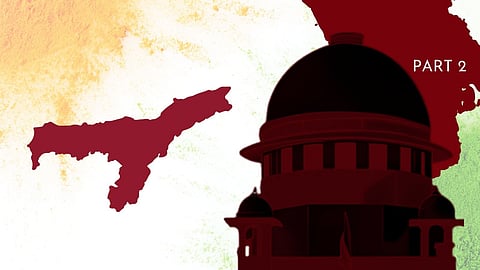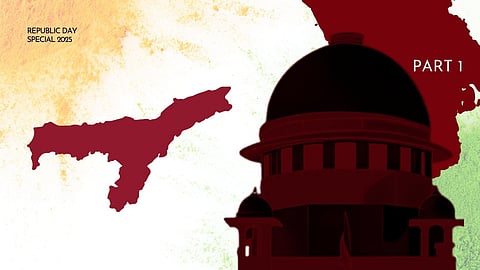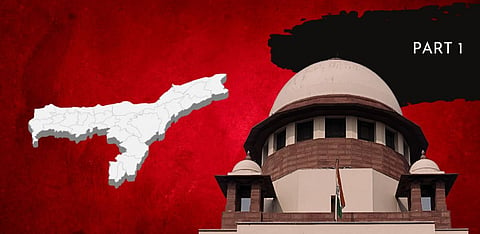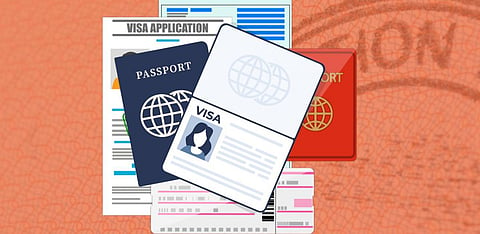Examining Assam government’s response to SC amidst illegal detention of foreigners in ‘transit camps’: Part 2

Examining Assam government’s response to SC amidst illegal detention of foreigners in ‘transit camps’: Part 2
In the second part of this series, we question the proportionality of detention given the low likelihood of deportations


The writer is the executive director, South Asia Human Rights Documentation Centre.
Published on:
05 Feb 2025, 11:08 am
Follow Us
As the first flight carrying Indians deported from the United States, it would do well to remind ourselves that this is being done with the acquiescence of the Indian Government. And rightly so. However, after the Supreme Court’s order of February 4, 2025, directing the immediate deportation of 63 individuals in detention camps, the Assam government and the Union find themselves between a rock and hard place.
Clearly, the deportation process will not be following accepted bilateral procedures on deportation agreed upon earlier between India and the once SheikhHasina ruled Bangladesh. There is a distinct possibility of forcible deportations and pushbacks at the already tense Indo- Bangladesh border.It is also another impediment to normalizing relations with our eastern neighbor. Given the mood of the streets in Dhaka, if Bangladesh shows acquiescence to the deportations by India, it will be a major nail in the coffin being built for the Mohammad Yunus led interim government by a range of actors on the political chessboard for Bangabhaban.
The move is also bound to attract international opprobrium. As is, Raisina Hill does not enjoy the political or economic heft to be able to expend diplomatic capital under President Donal Trump on the issue of immigrants.

A little Background
As per the Assam Accord of 1985, the official reason why declared foreigners are kept in detention centres is to facilitate the Border Security Force (BSF) to apprehend them after the procedure for deportation to another country has been finalized. In a similar articulation, the Gauhati High Court has held that the purpose of detaining foreigners in detention centres immediately after detection is to ensure that they “do not perform the act of vanishing”. This reasoning does not differentiate between different individuals and their risk of absconding. Beyond this, a broader issue with detention is that in practice, deportation is highly unlikely to occur.
According to a report by Amnesty International, as of August 31, 2018, only 128 declared foreigners had been deported to Bangladesh, the alleged country of origin of the majority of declared foreigners. Notably, many of those detained have not even been declared foreigners yet. Still, they fall within the category of “D-voters” – those whose citizenship status is merely doubted or debated, and who have not in fact been declared foreigners yet. For D-voters, the prospect of deportation – which is the underlying motivation for preventive detention – is even more unlikely. In fact, because India declares individuals’ foreigners without consulting the individual’s alleged country of origin – usually Bangladesh – the responding country may refuse to allow the individual to be deported there, thus leading to roadblocks in the expulsion process and to an indeterminately prolonged detention. This, again, stands clearly opposed to basic principles of international law, which hold that detention must end when it becomes apparent that deportation is not likely to occur within a reasonable period.
Given the mood of the streets in Dhaka, if Bangladesh shows acquiescence to the deportations by India, it will be a major nail in the coffin being built for the Mohammad Yunus led interim government by a range of actors on the political chessboard for Bangabhaban.
The location of Detention Centres is concerning
Article 9(1) of the International Covenant on Civil and Political Rights (‘ICCPR’) is to be interpreted in a way that individuals whose proper sentence or final decision is pending shall not be detained in prisons, and instead be detained in separate detention facilities. This interpretation is supported by the General Comment No.35, which notes that “any necessary detention should take place in appropriate, sanitary, non-punitive facilities, and should not take place in prisons.” In violation of this,the six explicit detention facilities established by the Assam government are located within district prisons, where declared foreigners mingle with convicts.

Detention as default option
In fact, India appears to be violating Article 9 of the ICCPR on multiple grounds. First, while detention may legally only be applied when other means are not suitable, it has become the default. It is thus imperative that the Indian government instructs its law enforcement personnel in Assam to resort to non-custodial measures first. Second, orders for detention are issued based merely on the perception that an individual is a foreigner. Although preventive detention is legal under Indian law, it is an error of judgment to assume that all declared foreigners will abscond pending a final decision on their future if not detained.
India thus clearly violates Article 9(1) of the ICCPR, as nobody evaluates the risk of absconding of each person individually. Finally, the purpose of detention is unclear, as it is officially being imposed to facilitate deportation, while such deportation in reality rarely occurs. Therefore, while this form of preventive detention may be permissible under domestic law, it is highly arbitrary under international law.
Although preventive detention is legal under Indian law, it is an error of judgment to assume that all declared foreigners will abscond pending a final decision on their future if not detained.
Category III fair trial issues
The detention ofdeclared foreigners, as a means, is disproportionate to its end goal and thus arbitrary. However, the argument can be extended by highlighting how the process of identifying a “foreigner” through so-called Foreigner’s Tribunals in itself violates core principles of international law.
The United Nations Working Group on Arbitrary Detention has reiterated that the deprivation of liberty is unlawful if it falls under one or more of five categories. Category III states that a deprivation of liberty is unlawful if there is a total or partial non-observance of the international norms relating to the right to a fair trial as enshrined in Article 14 of the ICCPR. In other words, an arrest or detention that is ordered through an unfair trial is by default arbitrary.
The procedural safeguards held in the sub-provisions of Article 14 are extensive. First, they set out the requirement of a fair and public hearing by a competent, independent and impartial tribunal established by law, and codify the crucial principle that an individual must always be considered innocent until proven guilty. Additionally, fair trial guarantees entail that an individual must be “informed promptly and in detail in a language which he understands of the nature and cause of the charge against him”, that he must “have adequate time and facilities for the preparation of his defense and to communicate with counsel of his own choosing”. It also guarantees that the individual has the right to attend his own hearing. Next, if a final decision was reached in a case, the case may not be judged upon again in the same form.
However, should there have been a miscarriage of justice, or should new facts arise that would exonerate the individual, the victim of the error shall receive compensation unless the error was attributable to him. While the language used in Article 14 could be seen to indicate that the procedural safeguards apply only to those with criminal charges against them, these provisions are considered basic principles of due process that apply to civil proceedings as well.

Visa vertigo: Australia and Canada’s new immigration blues
Foreigner’s Tribunals
Within the ongoing process of updating the National Register of Citizens (NRC), every individual in Assam is required to produce evidence regarding their citizenship (something we will elaborate on later in the series). In case of irregularities or prima facie contradictions, both the Assam police and the Border p are authorized to start a preliminary enquiry into the case. If this enquiry gives grounds for suspicion, the police can then file a case to one of over a hundred Foreigner’s Tribunals (FT) in Assam. FTs are established and operated under the Foreigner’s (Tribunal) Order of 1964. According to Article 2(1) of the Order, “the Central Government may by order, refer the question as to whether a person is or is not a foreigner within the meaning of the Foreigners Act […] to a Tribunal to be constituted for the purpose, for its opinion [sic.].” Importantly, the Order does not specify any rules of procedure, and FTs thus function largely based on ad hoc rules and judges’ personal preference.
Applications filed by the police to an FT must include concrete grounds for doubting the nationality of the person concerned. It is only at this point, after the application has been filed and the FT has agreed to launch a trial, that the accused is informed of the ongoing investigation and summoned to trial. The accused person, ideally, receives the summons to trial both digitally and as a physical copy, and is informed of the concrete grounds on which their nationality is doubted. In practice, however, the summons are often unsatisfactory.
The Caravan, for instance, reported the story of Kamala Begum, who in February 2012 was summoned to the FT in Barpeta, Assam to submit documents that would demonstrate that she is not a foreign national. However, the notice did not specify the grounds on which the authorities doubted her nationality, and merely demanded she present her evidence in front of the tribunal within the next three weeks.
In other cases, individuals have been denied access to their own hearing if they only received a digital summons. Instead, they were told that they required a physical notice of summons to be allowed to submit evidence in their favour. Hence, the accused often does not know what specifically is required, and understands little about what in fact awaits them, leading to an extreme power imbalance.
Legality and Independence
Article 14(1) of the ICCPR sets out the right to be tried by a competent, impartial and independent tribunal established by law. In order to universalize what makes a tribunal impartial and independent, the United Nations passed a resolution identifying common Basic Principles on the Independence of the Judiciary. Three paragraphs stand out specifically: First, the judiciary shall decide on cases brought to it “on the basis of facts and in accordance with the law, without any restrictions, improper influences, inducements, pressures, threats or interferences, direct or indirect, from any quarter or for any reason.” Second, “tribunals that do not use the duly established procedures of the legal process shall not be created” and all individuals have the right to be tried by an ordinary organ of the judiciary. Third, it states that those appointed as judges and lawyers shall have been trained in legal practice and shall have “appropriate […] qualifications in law.”
In other cases, individuals have been denied access to their own hearing if they only received a digital summons. Instead, they were told that they required a physical notice of summons to be allowed to submit evidence in their favour.
Lack of Judicial Independence
As per the ICCPR, the judiciary is meant to decided cases “on the basis of facts and in accordance with the law, without any restrictions [such as] improper influences, inducements [or] pressures […]”. However, the procedures of Assam’s FTs have severe shortcomings in this regard. As mentioned above, there has been a significant increase in recent years in efforts to detain those who were previously declared foreigners, and an even more striking increase in the number of those declared foreigners in the first place. According the online portal Scroll, the 2016 elections in Assam have contributed to increased efforts by the state government to fulfil the 1985 Assam Accord, and thus also increased pressures on the judiciary and executive to detain illegal immigrants. This can be seen in the increase in the number of FTs established after2016.,Bhaskar Jyoti Mahanta, Assam’s additional Director General of the Border Police recently remarked: “We are supposed to be arresting everyone declared a foreigner. The court has chided us for not making arrests.” In 2017, the then Chief Minister of Assam, Sarbananda Sonowal, stated in an interview with the press that 19 members who worked at an FT had been fired in 2017 “on the grounds of unsatisfactory performance.” Sonowal elaborated that members are given ratings based on how well they fulfil monthly targets. Specifically, “if some member declares not just the accused as foreigner but manages to bring in the family members then their rating would be very high for that case […].” At that point, the final version of the NRC was due to be published on August 31 2019, and the state government was rushing to finalize names for the register. Although the deadline has been postponed repeatedly before, it is apparent that FTs are under extreme pressure to identify and declare foreigners. The independence of the tribunals cannot be guaranteed under such circumstances.
Prohibition of Tribunals That Do Not Use Established Legal Procedures
As per Article 4 of the Foreigner’s (Tribunal) Order, FTs function under the Code of Civil Procedure of 1908, and thus have powers comparable to that of civil courts. However, they are not really judicial bodies. This document thus alleges that the role of FTs in the process of determining foreigners constitutes a violation of Article 14(1) of the ICCPR as it has not, until recently, used duly established legal procedure. Importantly, the decisions issued by FTs are not referred to as binding anywhere in the Foreigner’s (Tribunal) Order, but merely as “opinions”. In fact, until a recent amendment in May 2019, the concept of res judicata, in practice, often remained absent from proceedings of FTs, leading to a situation where one person’s nationality could be questioned in different trials at different tribunals, or where a person who had already successfully defended their case before an FT was summoned again. Admittedly, the Gauhati High Court has held that res judicata should apply to Foreigner’s Tribunals, this order cannot be said to have been enforced until recently. The element of res judicata was properly introduced to FTs only after the amendment of May 2019. With this, India removed an issue that would have otherwise caused SAHRDC to allege a violation of Article 14(7) of the ICCPR. Nonetheless, decisions issued remain quasi-judicial, and do not serve as legal precedents for future cases.

Madras High Court upholds citizenship rights of Sri Lankan refugees
Untrained Lawyers
In order to increase efficiency, the state government had, in recent years, constructed more and more FTs. At the same time, there is a lack of skilled personnel that could be employed by the Tribunals. Hence, FTs have started employing lawyers with minimal experience or retired judges. This, again, stands in contradiction with the Basic Principles, specifically Paragraph 10, and thus leads to assume a violation of Article 14 of the ICCPR.
Hearings Not Public
The quasi-judicial nature of the FTs is not limited to the employment of untrained judges. As per Article 14(1) of the ICCPR, everyone “shall be entitled to a fair and public hearing […].” However, FTs do not permit open trials, and anyone seeking to attend a hearing must have a document permitting his entry into the premises. The hearings at the FTs thus lack transparency, leading to a situation in which potential procedural errors or mistakes on the merits cannot be traced easily.

